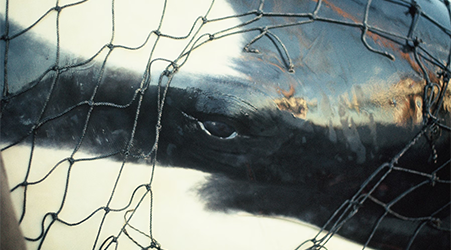After half a century in a tank, a beloved orca was about to be freed. Then her life ended, and a moment of reckoning began.
||| FROM WASHINGTON POST |||
She was 3 or maybe 4 years old on the last day she saw her family, when the men came in spotter planes and speedboats, hurling seal bombs that sent 200-decibel blasts reverberating through the currents of Puget Sound. She stayed close to her mother, the pair of them among nearly 100 terrified and disoriented southern resident orcas who were driven north along the eastern shore of Whidbey Island, until they were trapped in the shallower waters of Penn Cove.
It was unusually cold that August of 1970, and Terrell C. Newby still remembers that he arrived at Whidbey Island wearing a thick red-and-blue sweater that his mother had knitted for him. He was 30 years old, a student of marine biology and a Vietnam veteran who had returned from the war less than two years before. He had come to Penn Cove because he’d been invited by the men who were leading the orca capture: Ted Griffin, who owned the Seattle Marine Aquarium, and his business partner, Don Goldsberry. Their intent was to pull roughly half a dozen orcas from the water — young ones, 10 to 12 feet long, old enough that they wouldn’t perish when separated from their mothers but young enough to be compliant — and sell them to marine parks around the world for display.

By the time Newby set foot on the dock, the most desirable whales had already been cordoned off behind nets in the water, and his job was to sit in an eight-foot pram and try to keep the panicked mother orcas away from their babies. It was exhilarating and frightening at once — virtually nothing was known about orcas at the time, and Newby had no idea what might happen to him if they tipped his boat and he fell into the water — but despite the desperation of the whales, none showed aggression toward him.
He found the scene disturbing, but he didn’t feel truly horrified until he heard shrill cries and saw that the men had trapped the juvenile female orca against the dock. She was squealing frantically as a net was pulled over her body, and her mother was calling out in response, lifting her eyes above the surface to maintain sight of her calf.
The young whale was lifted from the water, wrapped in moist towels and loaded onto the back of a flatbed truck, and Newby was told to ride with her down to Seattle. He took his place at her side, and found himself fixed in her wide, dark gaze. Here, he would say, five decades later, is where I started getting really undone. He watched her eye move from his face to the buildings shuddering past along the highway, and he wondered how foreign it all must seem to her — to be outside the only element she’d ever known, her body unfamiliar with the burden of its own weight.


She stared and stared. He took a photograph of her, and a sickened feeling began to spread in his chest. His mind carried him back to the Mekong Delta, where he had been tasked with making solatium payments to families who had lost livestock or loved ones to American attacks. He’d once sat beside a mother who wept over the body of her baby on a rice mat, as they tried to determine a fair price for a lost child. That moment returned to him as he looked into the piercing eye of the young whale.
It took nearly two hours for the truck to lumber south to the city, and the orca never made a sound. Newby gently rubbed her head, poured water over her, murmured It’s going to be okay, not believing his own words.
In Seattle, he touched her one last time before he slipped off the back of the truck. Bye, baby, he whispered. Then he got in a car bound for Penn Harbor to prepare the next whale for transport. He would finish his job, and then devote his life to the study and protection of marine mammals, fighting to outlaw captures like the one he had just participated in. Riding north in stunned silence, Newby had become only the first of many who would describe themselves as forever changed by the orca known as Tokitae.
**If you are reading theOrcasonian for free, thank your fellow islanders. If you would like to support theOrcasonian CLICK HERE to set your modestly-priced, voluntary subscription. Otherwise, no worries; we’re happy to share with you.**








Oh dear, Lynn, is it just me, or can’t we all see the rest of the Tokitae article??
‘
Oh, sorry, Margot — and everyone else. Here’s the link: https://www.washingtonpost.com/lifestyle/interactive/2023/tokitae-lolita-orca/ It’s now updated in the story. And is definitely a must-read.
Terrifying, man’s inhumanity to nature, unrecognized..